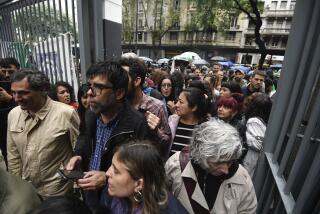U.S. court rules against Argentina on debt default
Argentina’s long slugfest with Wall Street over its sovereign debt default — the largest ever — has left the South American nation unbowed after losing another round in U.S. courts.
A federal appeals court ruled Friday that Argentina must pay a group of bond investors more than $1.3 billion, the full amount of principal and interest, if it wants to continue making discounted payments that other creditors have agreed to accept.
Argentina has publicly vowed to never pay face value on those notes, so the unanimous decision by the three-judge panel of the U.S. 2nd Circuit Court of Appeals could force a default on the country’s other debts.
However, the court stayed its ruling to allow the U.S. Supreme Court to decide whether to hear an appeal from Argentina in a related case. Yields on Argentine bonds fell slightly after the ruling, reflecting the fact that the stay at least buys more time for the country.
The heated dispute between the nation of 40 million and a group of investors led by hedge funds Elliott Management and Aurelius Capital Management has drawn wide attention in the world of international finance, where it has been called “the trial of the century.”
Argentina’s supporters, a group that includes the International Monetary Fund and France, have expressed concerns that the ruling could make it more difficult for poor countries to restructure unmanageable debt load.
Many on Wall Street, meanwhile, argue that a victory for Argentina would undermine confidence in U.S. markets and potentially shake the international bond markets.
The decision, which upholds a District Court ruling in November, “confirms that Argentina is not above the law,” said Theodore B. Olson, a lawyer who represents the investors.
He and his clients have argued that Argentina has consistently defied laws in New York State and elsewhere in its refusal to pay the old debts.
The fight was triggered by Argentina’s record default on nearly $100 billion in bonds in late 2001. Although the country was able to restructure most of that debt to pay investors at a discount, a small group holding about 7% of the total value refused to consent to the deal.
Those holdouts sued Argentina in various courts, demanding the full amount of their investment, plus interest.
Some have attempted creative measures to recover value, at one point persuading a judge in Ghana to seize an Argentine warship at port in a bid to extract a ransom.
The ship, La Libertad, was ultimately released, and the holdouts have had difficulty recovering any value on their investment. Elliott, which was not an original investor, has declined to say how much it spent on the
secondary market to acquire defaulted Argentine debt.
In the 2nd Circuit ruling, Judge Barrington Parker wrote that the “decision does no more than hold Argentina to its contractual obligation of equal treatment,” and he noted that the court believed the case was unique and would not affect other debt matters.
In June, Argentina filed a separate petition asking the U.S. Supreme Court to review a lower court ruling that barred the country from making debt payments to other investors without also paying holdouts.
Critics of the ruling have argued that it will encourage investors like Elliott and Aurelius to refuse offers to restructure debts in the future.
“Today’s ruling means that these funds will more aggressively target poor countries and struggling economies,” said Eric LeCompte, executive director of Jubilee USA Network, a faith-based nonprofit group that fights global poverty.
The IMF and the U.S. Treasury have spoken out against the court decisions, even as they have criticized Argentina for its handling of the acrimonious dispute. Most recently, France, in a brief filed to the Supreme Court in July, said the lower court ruling would “threaten international financial stability.”
Investors who accepted the discount deal have taken Argentina’s side as well, arguing that an adverse ruling could hurt their interests.
That’s because Argentina’s president, Cristina Fernandez de Kirchner, has vowed to never pay the holdouts a cent more than paid to those who took the deal. And because the court ruling would require Argentina to pay the holdouts at the same time as it pays other debtors, it would probably enter into default.
Argentina has not publicly commented on Friday’s ruling.
The high court, which is not in session, has not yet said whether it will hear the petition the nation filed in June.






